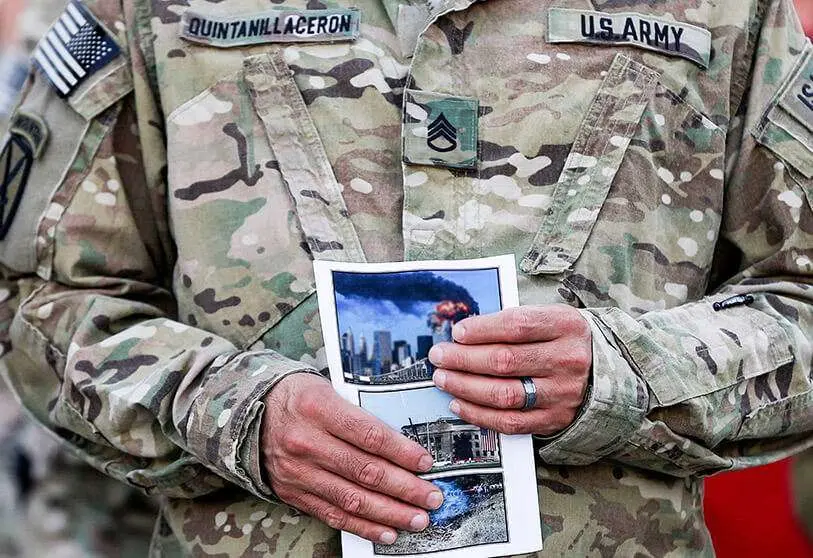12 September

On 11 September 2021 we are confronted with the truth. The fire and the images of the plane crashing into the World Trade Center in New York. The victims were crying for help at the windows, waiting for a horrific death in the flames, and perhaps they felt the trembling of the buildings beneath their feet. The smoke and the screams of panic in Manhattan broadcast on televisions around the world. The uncertainty. The terror. 20 years after the largest mass murder in history by a terrorist group that took the lives of 2,977 people, we have finally realised the unbridgeable gap between truth, lies and history.
The first truth is that a group of murderers, Al-Qaeda, used planes with passengers piloted by terrorists as weapons of war, with the intention of provoking a massacre by killing more than 50,000 civilians working in the Twin Towers in order to represent, with the macabre attack, the beginning of a new fanatical millennium and the end of the Western democratic order. They chose as their victims the citizens of America's most symbolic city and attacked the symbols of that military, economic and cultural power. The invulnerable image of the United States, the security of the world order and the unconquerable economic progress of the West were shattered, along with the lives of the victims of the attack.
The second truth is that, faced with the magnitude of the brutal and unimaginable attack, the United States mounted a comprehensive, internationally legitimised and supported response to punish those responsible and to reduce the terrorist threat that had become the first priority for US and global security since 9/11. The first military actions began in Afghanistan on 7 October. Afterwards, the Patriot Act was drafted and approved to provide legal and political cover for the strategy, and actions were extended to a second scenario, Iraq, which did not enjoy unanimous international support and was contested by social sectors and some governments.
From that moment on, truth was replaced by history. The justification for the possible existence of weapons of mass destruction in Iraq turned out to be inconsistent and false, and the US redefined a renewed strategy to push for military deployment. Politically, it was to project change in the MENA region by promoting democracy and supporting pressure on certain regimes and leaders. The proliferation of terrorist groups and mercenary assassins and indiscriminate attacks in a number of countries and major cities in countries allied to the US internationalised the conflict. And the progressive involvement of rival regimes such as Iran's led to a guerrilla war in Iraq, which in turn sparked enmities and clashes between Islamic religious factions and diverse political interests.
Obama's accession to the presidency attempted to maintain strategic objectives, but increased political action on the ground in Middle Eastern countries. The Arab Spring set in motion a succession of violent protests against dictators in some countries, calling for the advancement of freedoms in those countries. It eventually triggered the start of the Syrian conflict and repression by regimes better protected by their economic relevance or their ability to receive foreign aid from third parties. Osama bin Laden, identified by US intelligence in Pakistan, was killed, as were dozens and hundreds of terrorist leaders and collaborators, as well as thousands of victims, fighters and civilians, as part of the armed actions that were already taking place in three theatres at the same time. In 2014, the president announced a change of strategy to begin a slow and progressive withdrawal, altered and hindered by various historical circumstances.
In 2017, with Donald Trump in the White House, the United States definitively modified its national security strategy with new visions and objectives and placed other priorities before the fight against terrorism. Rivalry with China, the first of these, once the emergence of the Asian economic power had strengthened its aspiration to become a political power, taking advantage of the erosion of the United States. The catastrophe in Syria highlights the failure of the international multilateral order in this long endgame, which has been exacerbated by the neo-isolationist parenthesis of the Trump administration, which has finally opted to review its alliances with certain Middle Eastern countries and confirms the US withdrawal from Afghanistan.
A just war requires a just cause, just proportion and the goal of restoring peace. The objectives of the war on terror were distorted by lies and by historical events in a conflict that vary and pervert the path to peace. The proportion of means used was uneven. The United States went down into the stinking terrain of the terrorists to defeat them and warn them of the consequences of falling into criminal fanaticism. It did not always do so proportionately. But it would never have been fair to respond to a massive attack with suicide passenger planes by using the police and fire brigade. And finally, the attacks on the Twin Towers which we have seen on television 20 years later. And which have confirmed once again that the cause was just. Spain understood this and sent our support and our soldiers, right up to the last moment in Afghanistan, to pursue the terrorists and re-establish international security and peace.

